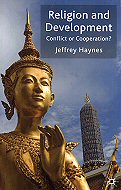|
Religion and Development: Conflict or Cooperation?
|
|
Jeffrey Haynes
|

|

Increasingly, the role of religion has become central to the understanding of international development. Traditionally, development studies focused on the causes of poverty, and religion was viewed as detrimental to progress. More recently, however, this negative consensus has broken down, partly due to the widespread failure of secular development programmes to achieve poverty reduction and end inequality and injustice. Religion is now seen as potentially crucial to the achievement of development aims.
In this book, the first text to examine the impact of religion in the developing world, Jeffrey Haynes introduces students to the key themes and theoretical perspectives, outlining:
• The rise of faith-based organizations
• The principles of key religious groups
• A typology of groups active in conflict, conflict-resolution and peacebuilding
• The role of faith-based organizations in achieving the Millennium Development Goals, including economic growth, environmental sustainability, health care and education.
Focusing on the four major religions, Islam, Christianity, Hinduism and Buddhism, and their role across Africa, Asia and Latin America, Haynes examines both the positive and negative aspects of religion as a developmental aid, and, in doing so, also questions the assumptions that have underpinned the study of development. This essential text will be invaluable to all those concerned with the study of the developing world.
Jeffrey Haynes is Professor of Politics at London Metropolitan University, UK, where he teaches courses on religion, politics, and international relations. He has published widely on international development including Palgrave Advances in Development Studies.
|
|
